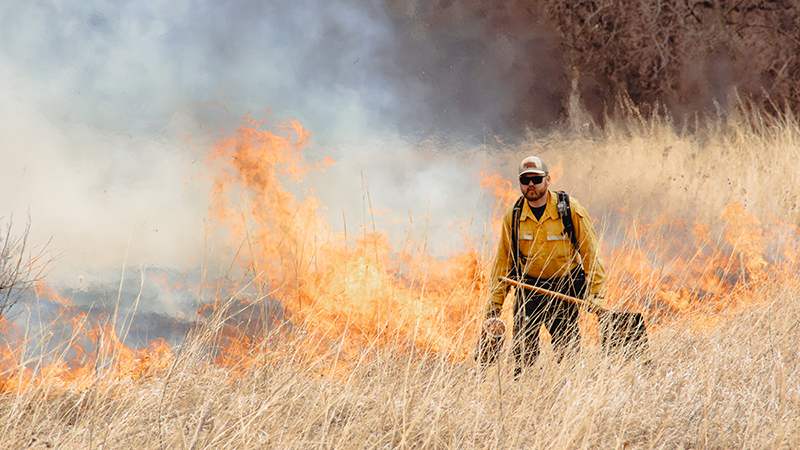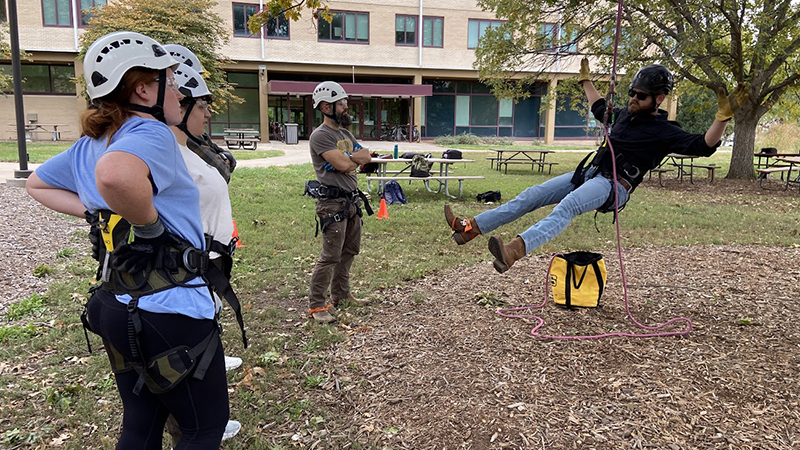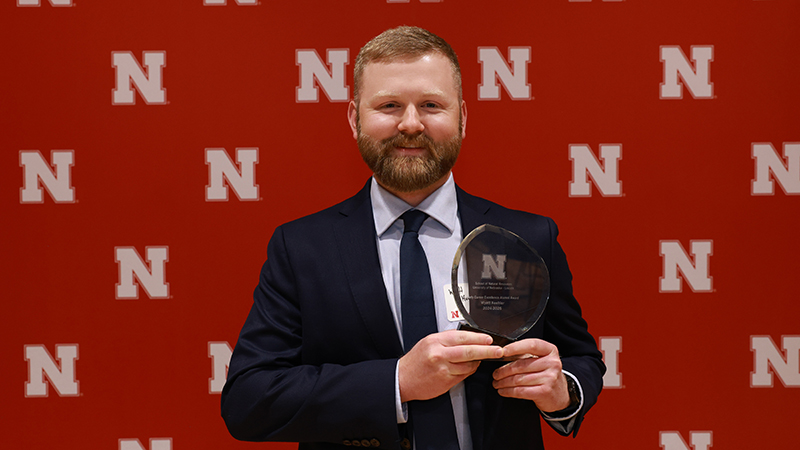Posted: 6/26/2025
SNR Alumni: Koehler wins Early Career Excellence Alumni Award

By Ronica Stromberg
Within three years of graduating from the School of Natural Resources, Wyatt Koehler took home its Early Career Excellence Alumni Award for showing a great impact in his field while still within 10 years of graduating. Not wanting to boast, Koehler pointed out after receiving the award on April 12 that he actually had almost 10 years of work in his field.
"I like to say I've been working in land conservation since I graduated high school," the 2022 graduate said. "So, my career, luckily, started early, and that's been a big benefit."
As the senior coordinator of habit management at Spring Creek Prairie Audubon Center, Koehler works with a team to manage 1,160 acres of grassland. Since August 2024, he has been in charge of keeping the land clear of trees and invasive species through burning, grazing and other management techniques.
His land management experience started much earlier, though, when as a senior in a Minnetonka, Minnesota, high school, he headed out on spring break to take part in a fire academy in Salina, Colorado.
"It was very addictive almost because that fire academy allowed us to get live fire experience," he said. "Rather than just sitting and doing presentations and that sort of stuff, we actually got to go out, put fire on the ground."
His older sister was attending University of Nebraska–Lincoln, and Koehler was offered a scholarship to Nebraska. He decided to pursue an education in natural resources, starting in hydrology in fall 2016. To pay for college, he continued working summers and took breaks to fight forest fires for the federal government. With Nebraska’s central location, he was able to move quickly to places as distant as Suffolk, Virginia, and Challis, Idaho.
Arriving back from one of his breaks from college to make money, he learned the School of Natural Resources had started the Regional and Community Forestry program.
"I go, 'You know what? That sounds more my speed,' so transferred in," Koehler said. "I think I ended up being the third graduate of that program since it restarted."
He took most of his major classes with Dave Wedin, Lord Ameyaw and Ann Powers. Powers said Koehler stood out as deserving the Early Career Excellence Alumni Award because of his "with-it-ness."
"He has the ability to be present but, at the same time, anticipate what needs to or is going to happen next," she said. "He additionally takes the initiative to plan for those next steps, which makes him an invaluable team member. Some people are all talk and no action. Wyatt has already got the job done before they're done talking."
Prior to his current position, Koehler "got the job done" for the university as a Habitat Management and Prescribed Fire Education coordinator under Wedin. In the position, he managed Nine-Mile Prairie and Dalbey Prairie and led students on about 60 prescribed burns. He burned several with Ed Hubbs at Spring Creek Prairie Audubon Center.

Later, when he saw the center's opening for a senior coordinator of habit management, he applied for the position and received it. He has organized teams and carried out prescribed burns on the center's property. He said they are burning more frequently and larger acreages to get a three- to five-year return interval on the tallgrass prairies.
"Historically, most grassland areas typically have burned every three to five years," Koehler said. "That's kind of the sweet spot as far as a healthy, resistant grassland goes. That hasn't been the case since settlers, just due to our aversion to fire. But to keep woody species out of tall grass prairies, you just need to keep burning."
Native Americans and lightning used to burn much of the prairie, but climate change and the stifling of fire have allowed trees and brush to invade the prairies, Koehler said.
"We have higher carbon levels and higher nitrogen levels in the atmosphere right now, and that's very good for our deciduous brush species like dogwood and sumac," he said. "They're living their best life at the moment, which means they're taking over massive tracts of tall grass prairie, as are red cedars."
Nebraska has one of the largest remaining grasslands in the world. That biome is quickly vanishing, Koehler said, pointing up the importance of his work.
"There is no such thing as passive management on properties anymore, as far as tall grass prairies or, really, as anything goes," he said. "So, just actively managing our ecosystems and tallgrass prairie is incredibly important. I’m not a huge fan of talking about myself, but what I'm getting the most out of it is just being able to conserve at least a little piece of the tall grass prairie while we have it."
Managing land is a lot like farming, he said, because every day is different and you can't get bored. He said he is "definitely happy" in his current work and would like to be a primary manager of a property like Spring Creek Prairie or a program director . . . someday.
"I'm enjoying the outdoor work a bit too much right now to decide to go to a desk job," he said. "I get a nice change of pace when I want to. I can either work at the desk some days or I can work outside in the field with cows all day. Definitely enjoying that at the moment."
